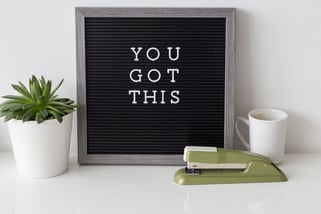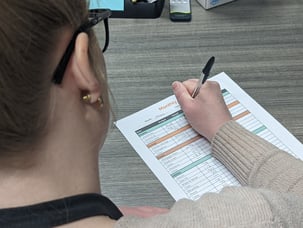Budgeting For Beginners

Budgeting is a concept that sounds so easy, but it can become overwhelming very quickly. And when you're overwhelmed, you are less likely to maintain discipline. We're here with some tools to help you stay the course.

Financial stress is real. It is one of the biggest reasons for stress1 among people today. Financial stress can come in many forms. Too much debt, sharing financial responsibility with others, or unexpected expenses (such as needing new tires or medical procedures) can create anxiety. If you can reduce stress from financial worry, it will allow you to focus on the more important areas of your life. When you have a handle on your financial situation, the peace of mind is priceless.
Let's Get Started
The best way to start is with a basic financial worksheet to document your income and expenses. We have created a free download for you to get started, or you can utilize any number of budgeting resources (most of which are free) such as the template in Microsoft Excel.
An important determination will be identifying spending for "needs" vs. "wants". A good budget template will help you identify those needs fairly easily, but "wants" will require some discussion based upon your family's unique situation.
Reminder: Needs are things you must honor. These are things such as rent/mortgage, utilities, groceries, child care, etc. On the other hand, a "want" is an item that's nice to have, but isn't required. Examples of wants include eating out, vacations, or entertainment like going to the movies.
Once your income and expenses are identified (including wants and needs), enter your numbers. If you're using our budget worksheet download, or a similar version, start by filling in the first column with your planned expenses. For instance, you might think you're going to spend $250 for groceries. In the next column, you're going to list how much you actually spent on that item for the month. You may have planned $250 for groceries, but you may have actually spent $227. Keep track of the difference in the third column and make any notes in the final column. For instance, your grocery bill may be down this month, but the school lunch bill may be up. Knowing why something is occurring will help you track patterns and hold you accountable. It will also help you plan better for future months.
As you begin to budget, plan to end each month at zero. This means after all your income (money-in) and expenses (money-out), you should have a little bit left over budgeted for savings. This is called a positive variance. By slowly building your savings, you will have funds available if an emergency occurs. Or if you have a month where your income decreases, you will have the means to compensate for the shortfall.
 Things to keep in mind:
Things to keep in mind:
-
Give it a couple of months to start working.
-
Budget to zero before the month begins.
-
Pad your grocery category. A lot of people are surprised by how much they spend in this category.
-
Budget as a family. If you're married, it's important for both spouses to be on the same page. If you're feeling up to it, use this as an opportunity to teach your children about real-world finances as well.
-
Any time you can add even a small amount of money to your savings, you will find that it adds up to help you when the time is needed.
Financial expert Dave Ramsey says, "Personal finance is 20% knowledge and 80% behavior". Recent studies have shown that, on average, it takes 66 days for a new behavior to become automatic 2. Budgeting can seem overwhelming, especially when you're starting to make it a habit. At Osgood Bank, we are committed to helping you succeed. If you find you need extra assistance, one of our team members would be happy to sit down with you to help you start your very own budget plan. You can request an appointment with the link below. Remember, you're not alone on your journey to financial wellness. We're here to help you do well and be good.


